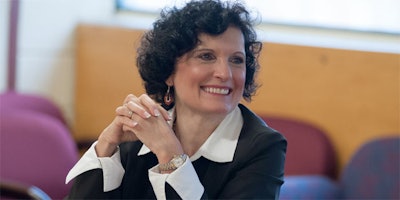Under the University of Vermont’s (UVM) new open-access academic press, authors and readers will not have to pay fees to publish or access published materials. Dr. Bryn Geffert
Dr. Bryn Geffert
The move by UVM Press – overseen by UVM Libraries – is meant to eliminate financial hurdles and barriers to peer-reviewed research that traditional publishing and access models impose. This endeavor was announced last week, with its first publication, The Journal of Ecological Engineering Design, released that week as well.
"It is indeed completely free,” said Dr. Bryn Geffert, dean of libraries at UVM. “It was very important to us that we have a model that does not charge either readers or authors, and that the only criteria for publishing with the press is the quality of the work, not the author's ability to pay."
Entwined in UVM Press’s diamond open-access model is a sentiment of shared responsibilities and a commitment not to profit, according to its website. Collaborators will have to agree to publish digitally using Creative Commons licenses; use only the publishing platforms and resources provided by UVM Press; forgo processing charges, subscription fees, and membership requirements; engage in peer review; and maintain a rolling publication schedule for journal articles.
The press – it employs a “diamond open-access model” – is open to all scholars, including those not affiliated with UVM.
Open-access models are becoming increasingly popular but some of them may be cause for concern, Geffert said.
“We're seeing some, particularly large commercial publishers, launch or convert journals to open-access models where they do not charge readers for the work but are bringing in fees – sometimes even more fees than they were obtaining by selling journal subscriptions – by beginning to charge authors,” Geffert said. “I think there's a good argument that that sort of open-access is a model that simply perpetuates inequalities. This is particularly worrying for folks who are working at underfunded institutions, especially in the Global South.”
Geffert himself has prior experience with open-access models. Before UVM, he helped launch the Amherst College Press in 2013 and led a consortium of libraries in creating the open-access Lever Press in 2016.
 Dr. Patricia Prelock
Dr. Patricia Prelock
"I understand the mission of libraries to be a rather simple one, which is in part to make sure that everybody who needs good information and scholarship has access to that,” Geffert said. “I see this as a way to commit to the fundamental mission of libraries."
Another is to fulfill UVM’s responsibilities to communities beyond campus as a land-grant institution, said Dr. Patricia Prelock, provost and senior vice-president of UVM.
“It is our effort to really increase knowledge for the workforce. And this is one of the ways that we can do that,” Prelock said. “The power of knowledge access can't be understated. I think [Geffert's] vision has been powerful and one that our faculty have been behind, because they're very innovative and they want to get information out and take away barriers so that we can really support knowledge advancement and improve the world. And that's really what our goal is in a land-grant institution.”
Carl Maxwell, vice president of public policy for the Association of American Publishers, said his association support diverse Open Access business models as important options for financing and managing the peer review process, "and for supporting the extensive investments in education, research, and innovative digital platforms that are required to ensure the highest possible quality and integrity," he added. "Science benefits from a vibrant and competitive marketplace with a broad array of publishers and options for authors to communicate their research, including non-profit scholarly societies, university press, and dedicated open science publishers.”





















